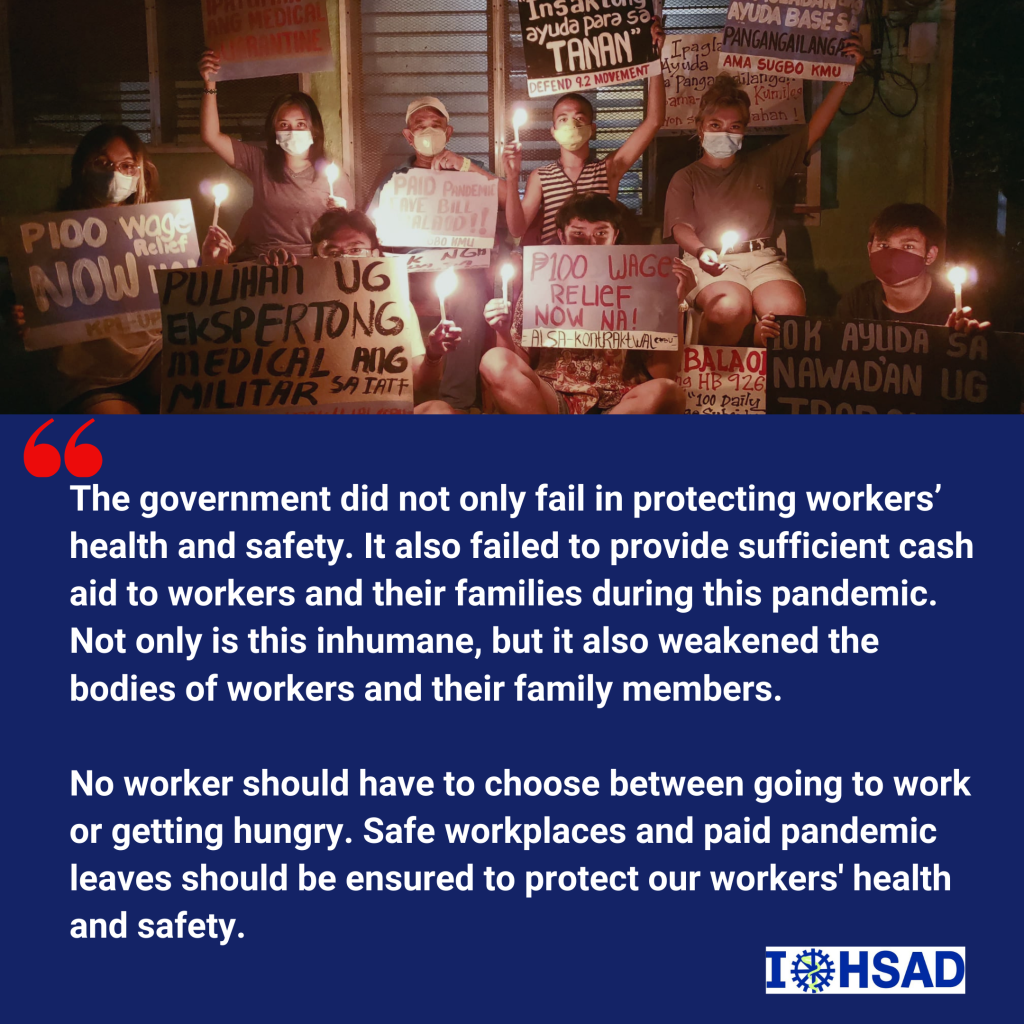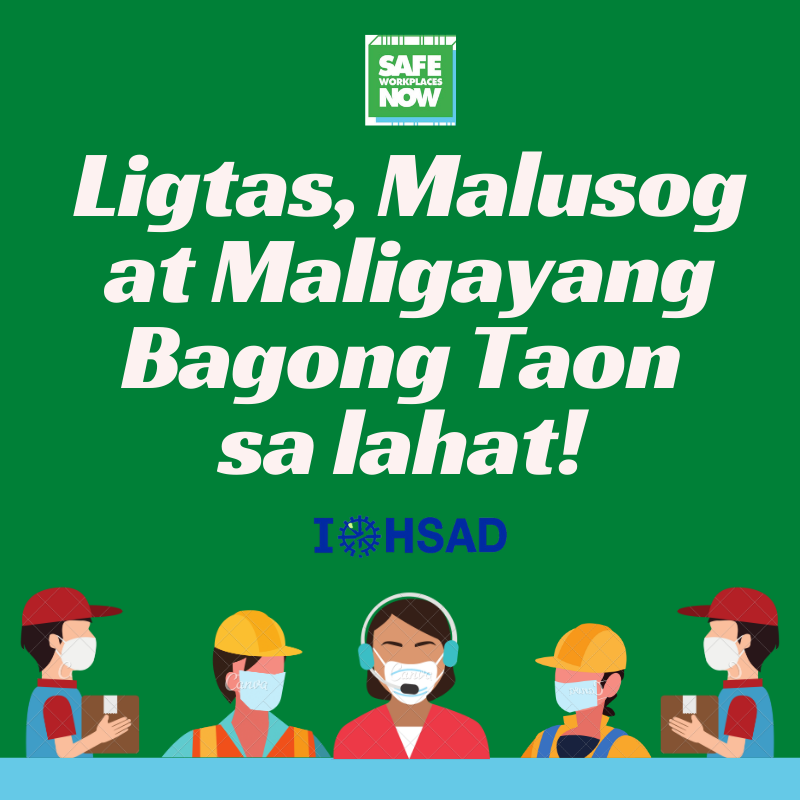
More than one year into the pandemic, and only after a consistent campaign waged by workers’ organizations, the Employees’ Compensation Commission has finally recognized Covid-19 as a work-related and occupational disease.
This is a small victory of the Filipino workers and workers’ organizations in the country, who had to fight, online and offline, for this most logical and human measure. Crucial to the implementation of this measure is the approval of Pres. Rodrigo Duterte of P30,000 compensation to workers. We at the Institute for Occupational Health and Safety Development (IOHSAD) unite with Filipino workers and workers’ organizations in calling on Pres. Duterte to approve and ensure the implementation of this measure.
We trust that Filipino workers and workers’ organizations will continue to be vigilant in keeping a close watch on, and securing the implementation of, this new government policy, and that workers will indeed benefit from it. We at IOHSAD will continue to collaborate with workers’ organizations to ensure that this will indeed be the case. At the same time, given the recognition of Covid-19 as an occupational disease, we will continue to fight for the Paid Pandemic Bill, a measure much-needed by the country’s workers at present.
This time last year during the International Workers’ Memorial Day, the International Trade Union Confederation (ITUC), the broadest alliance of workers’ organizations in the world, has called for the classification of Covid-19 as an occupational disease [1]. In the Philippines, ITUC affiliates recognized that while the disease cannot solely be contracted from the workplace, the reality is that workers face a high risk of getting infected due to working conditions. Compliance with occupational safety and health standards are often sacrificed to keep up with production and profit.

Filipino workers bore witness to the truth of this claim as multiple workplaces suffered from outbreaks last year [2-5], even with minimum health standards in place. Several factories located in special economic zones in Laguna recorded hundreds of Covid-19 positive cases last year that greatly affected workers’ health and livelihood. This situation brought more pressure on the government to classify Covid-19 as a compensable disease.
While the ECC has made Covid-19 compensable under the increased risk theory as early as February 2020 [6], workers have found it difficult to claim their benefits because of documentary requirements. It is difficult to prove that they contracted the infection at work when the country’s poor contact tracing and testing efforts have made it almost impossible to know whether any of their co-workers or any individual with whom they shared a common area are close contacts or asymptomatic yet infected. This has left much of the burden to the infected workers, who are already suffering from the disease and losing income from isolation.
Under the ECC Board Resolution No. 21-04-14, COVID-19 is considered both a work-related and occupational disease. This allows infected workers, regardless of the severity of their symptoms, to receive around Php 30,000 (pending approval by the President) if they contract the disease with any of the following conditions present [7]:
- A direct connection between the “offending agent or event” and the workers based on epidemiologic criteria and occupation risk (examples: health workers, contact tracing teams),
- The task assigned to the worker requires frequent face-to-face and proximity interactions,
- Transmission occurred in the workplace, and
- Transmission occurred while commuting to and from work.
Sources:
[1] International Trade Union Confederation (2020). COVID-19 should be classified as an occupational disease. Retrieved from https://www.ituc-csi.org/covid-19-occupational-disease
[2] San Juan, A. (2020). 4 more MRT staff have COVID-19; 202 now infected. Retrieved from https://mb.com.ph/2020/07/08/4-more-mrt-staff-have-covid-19-202-now-infected/
[3] CNN Philippines (2020). Over 300 workers in BGC construction site test positive for COVID-19. Retrieved fromhttps://cnnphilippines.com/news/2020/7/10/Over-300-workers-in-BGC-construction-site-test-positive-for-COVID-19.html?fbclid=IwAR36pamrE1W0cBtZK_MX1o-qffFEv3n7ANe5sek_3cybyb1IgTkIFcNdV3Y
[4]Casilao, J. (2020). 15 companies in QC being monitored due to 280 workplace-related COVID-19 infections. Retrieved from https://www.gmanetwork.com/news/news/metro/748876/15-companies-in-qc-being-monitored-due-to-280-workplace-related-covid-19-infections/story/?fbclid=IwAR0nrEJa2rOEyLoSpiPmjVNz8LrYkLDkzbB1iTbM9w10Ho94_3tpMBzM3-E
[5]Datu, D. (2020). Operasyon ng kompanyasa Laguna, sinuspindesadami ng COVID-19 cases. Retrieved fromhttps://news.abs-cbn.com/news/07/30/20/operasyon-ng-kompanya-sa-laguna-sinuspinde-sa-dami-ng-covid-19-cases?fbclid=IwAR2qxUw_phId9tDn_HrWIvjL7EqWYpguEIg0_-gOpAC-xnmOlOx0tOs9S6Y
[6] Employees’ Compensation Commission (2020). ECC reminds employees to be more cautious of COVID-19, apply EC benefits if applicable. Retrieved from http://ecc.gov.ph/ecc-reminds-employees-to-be-more-cautious-of-covid-19-apply-ec-benefits-if-applicable/
[7] Rey, A. (2021). Duterte asked to approve P30,000 per worker infected with COVID-19. Retrieved from
https://www.rappler.com/nation/duterte-asked-approve-compensation-per-worker-infected-covid-19








